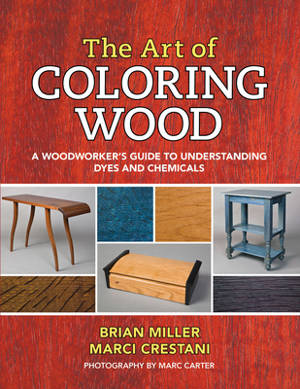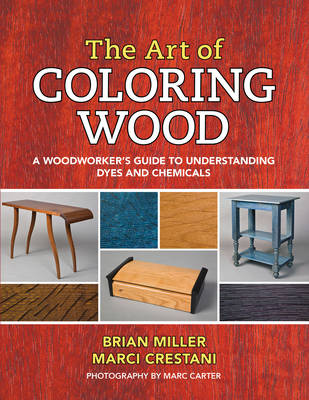
- Retrait gratuit dans votre magasin Club
- 7.000.000 titres dans notre catalogue
- Payer en toute sécurité
- Toujours un magasin près de chez vous
- Retrait gratuit dans votre magasin Club
- 7.000.0000 titres dans notre catalogue
- Payer en toute sécurité
- Toujours un magasin près de chez vous
The Art of Coloring Wood
A Woodworker's Guide to Understanding Dyes and Chemicals
Brian Miller, Marci CrestaniDescription
Learn How to Use Dyes and Chemicals Like a Pro
If you're a woodworker looking to take your skills-and your next project-to a higher level of craftsmanship, you might want to consider coloring your wood with chemicals and dyes instead of stains. Unlike stains that can trap light and obscure grain patterns, chemicals and dyes, when handled properly, are one of the best methods for enhancing a wood's color or accentuating the grain pattern. A classic technique that's been practiced for centuries, coloring wood is a sure way to infuse a "wow" into your woodworking efforts.
With expert guidance by Brian Miller, a professor of Wood Technology who teaches an actual course on coloring wood, The Art of Coloring Wood removes any and all intimidation of working with chemicals and dyes and is the perfect entry point for anyone looking to move on from simple stains to learn the art of coloring wood for dramatic effect. To keep the information accessible and relevant.
The Art of Coloring Wood focuses on the six most popular woods used by woodworkers-maple, quartersawn white oak, mahogany, walnut, cherry and alder-and outlines the unique characteristics with regard to coloring each. After the six woods are outlined, The Art of Coloring Wood moves onto the supplies needed, including brushes, sandpaper, and much more, before proceeding into the easy-to-follow and engaging chapters on the different chemicals and dyes that will make your woodworking shine. The beauty of The Art of Coloring Wood is Miller's simple approach that makes the chemistry very easy to understand. Each chapter offers recipes, insights, and many "a-ha!" moments that make learning about chemicals and dyes both fascinating and within easy reach.
With the helpful sidebars throughout the book offering tips, mistakes, and countless nuggets of information, The Art of Coloring Wood will have you understanding the methods and many worthwhile reasons for coloring your wood while chomping at the bit to get a project completed so you can finish it with style and flair.
Spécifications
Parties prenantes
- Auteur(s) :
- Editeur:
Contenu
- Nombre de pages :
- 144
- Langue:
- Anglais
Caractéristiques
- EAN:
- 9781610353052
- Date de parution :
- 15-11-17
- Format:
- Livre broché
- Format numérique:
- Trade paperback (VS)
- Dimensions :
- 213 mm x 277 mm
- Poids :
- 476 g

Les avis
Nous publions uniquement les avis qui respectent les conditions requises. Consultez nos conditions pour les avis.






